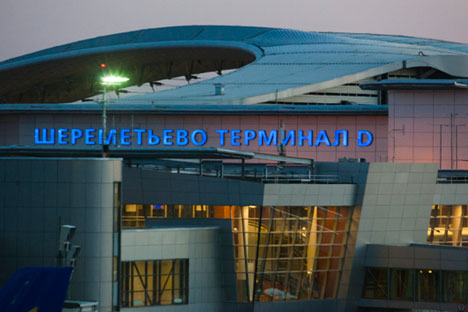
Sheremetyevo airport authorities denied the reports that this money was found on the airport territory. Source: ITAR-TASS
Sheremetyevo's shipping bill indicates that on board an aircraft arriving from Frankfurt were 200 wooden pallets of banknotes. Bank employees confirm that one pallet can hold 100 million notes in U.S. dollars or euros, making the estimated sum $27 billion or €20 billion altogether.
The same shipping bill indicates that the owner is 54-year-old Farzin Koroorian Motlagh (son of Ali, as indicated in all documents). His passport information is also included. The shipping bill has the identification code of the cargo, as well as the flight number and other information. The document specifies that the plane with the billions arrived in Moscow on August 7, 2007. For six years it has been standing there, "frozen."
In the airport documents, there is not a word about the recipient of the valuable cargo. A reporter, however, learned that the money was donated by Farzin Motlagh to the World of Good People All-Ukrainian Charitable Foundation. Such an organization actually does exist in Moscow: It is directed by a Russian citizen, 53-year-old Muscovite Alexander Shipilov, who is now trying to claim the money.
According to the documents, the fund authorized Shipilov to claim the cargo in Sheremetyevo and register it in his name to be held at the airport (according to the documents, "until the fund changes its status from 'Ukrainian' to 'International'"). However, the contract for donating the money to the foundation was signed only on March 17, 2013. Neither the airport management nor officials will comment about what happened before this, although Sheremetyevo’s press service has denied that the money exists and is in the airport. Shipilov also has refused to talk to the media.
"The cargo, judging from the documents, is real," says Vadim Lyalin, a lawyer who specializes in customs cases. "It could not be claimed because the recipient most likely didn't possess all the necessary paperwork. Additionally, the sender didn't indicate a specific recipient, which is very strange. This alone leads one to believe that the money itself is dirty. Surely someone made a claim for the money right from the start. But who did this is a mystery. There probably was a plan formulated for getting the money across the Russian border. After all, what sane person would just send that amount of money to ‘nowhere?’”
“Most likely, something went wrong: ‘Mr. X’ was not able to get there to claim the cargo. And after all the failed attempts to claim the cargo, it was decided to work through a foundation—which is, by the way, a usual route for money laundering,” Lyalin says. “They thought that donations would be handed over faster. That's why the donation contract was signed just this year. But that leaves us with a second question: Why didn't the government confiscate the money long ago? Does this mean that there wasn't sufficient reason to do so? The owner is down on paper and the money is real—sent from a German bank, according to the bank certificate.”
As a journalist discovered, representatives from the foundation have appealed to several very powerful lawyers to assist them in claiming the money. They promised a fee of €2 billion, but no one took them up on the offer. The receiver could have claimed the valuable cargo in court, but they did not appeal to the court.
“Customs required the owner of cargo to appear in person,” Lyalin says. “That's why these problems came up. The authorities had to make sure that he is alive, that he is not just a front man. Farzin Motlagh didn't issue a complaint. The sender, according to the documents, is a resident of Tehran and an Iranian citizen. His name has been mentioned in connection with investments in different parts of the world—mainly in Mauritius. But all the information is rather sketchy.”
"It is possible that this is the money of Saddam Hussein," says a security services employee. “I can't confirm this, but am just guessing. It is well known that $60–100 billion dollars belonging to the Iraqi dictator is circulating throughout the world.”
The president of Iraq was considered one of the richest men in the world. In fact, he made the third spot on the Forbes list. After his arrest and during questioning, Saddam did not disclose where his money was kept.
"In general, the amount is so huge that it casts doubt on the whole story," says Professor Nikita Krichevsky, a leading Russian economist. "Twenty billion euros is about 6 percent of the whole Russian state budget. If it was given to the state, we could meet the housing needs of a whole generation. In Europe, they don't see cash in this amount. Most likely, the money is intended for underground organizations.”
Sheremetyevo airport authorities denied the reports that this money was found on the airport territory.
All rights reserved by Rossiyskaya Gazeta.
Subscribe
to our newsletter!
Get the week's best stories straight to your inbox